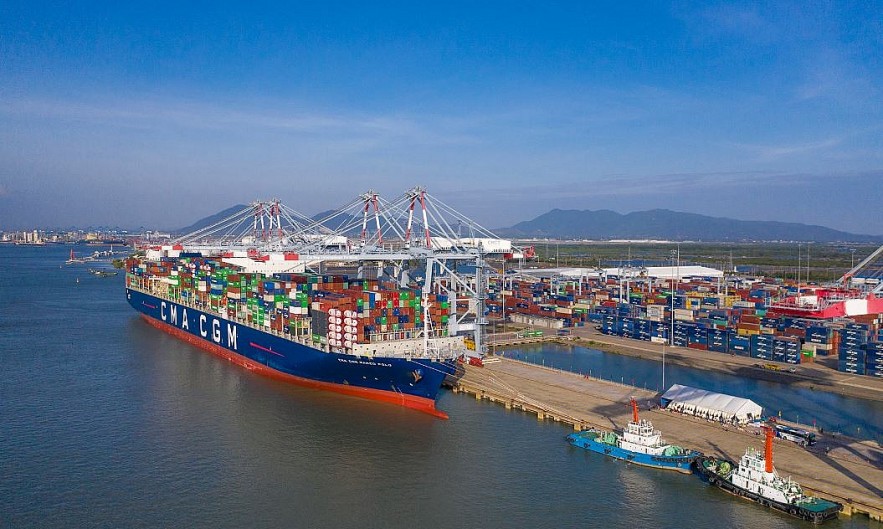New Generation FTAs Impacts on Digital Transformation and Policy Recommendations for Vietnam
 |
| Photo: Vietnamnet |
Digital transformation trends in Vietnam
Vietnam has one of the fastest-growing digital economies in Southeast Asia, thanks to the application of digital technology. Several industries in Vietnam are rapidly digitizing, such as e-commerce, tourism, digital content, and fin-tech. Though businesses in these fields still have difficulty applying new technology, they are aware of the importance of digital technology in production.
Vietnamese consumers are adapting quickly to digital economy's products and services, which facilitates investment attraction and digital economy development.
Vietnam is one of the first countries to test 5G technology. Internet infrastructure and the first nationwide internet program have been implemented since 2005 based on Decision No. 74/2006/QD-TTg, dated April 7, 2006, of the Prime Minister. In 2018, Vietnam joined the ASEAN Smart Cities Network (ASCN) and approved the Sustainable Smart City Development Plan for the period 2018 - 2025, with a vision to 2030.
According to the World Bank, there are five main pillars for a vibrant, secure, and inclusive national digital economy, including (1) digital infrastructure, (2) digital platforms, (3) digital financial services, (4) digital entrepreneurship, and (5) digital skills. Vietnam has recently spent considerable effort to build foundations for its digitalization to secure these pillars.
 |
| Photo: Communist Party of Vietnam Online Newspaper |
Regulations related to digital transformation in new-generation FTAs
Vietnam is a signatory to many free trade agreements. Recently, Vietnam has signed new generation FTAs such as the Comprehensive and Progressive Agreement for Trans-Pacific Partnership (CPTPP), the Vietnam - European Union Free Trade Agreement (EVFTA), and the Regional Comprehensive Economic Partnership (RCEP).
These agreements have established many regulations related to digital transformation, such as regulations on digital products, online consumer protection, e-commerce, and e-payments. New-generation FTAs also have provisions for the establishment of agencies related to digital transformation.
These FTAs are expected to contribute to increasing foreign investment in Vietnam, facilitating digital transformation, and attracting big foreign corporations. They can promote high-quality investment in industries such as high-tech manufacturing, health care, clean and renewable energy, artificial intelligence, research and development, and fin-tech. Thereby, Vietnam has the opportunity to become a gathering place for R&D centers. Vietnam can also benefit from the knowledge and technology that foreign investors bring.
However, they create several challenges for perfecting domestic policies and laws. This poses a requirement for Vietnam to amend some of its current regulations.
Policy recommendations for Vietnam
First, Vietnam needs to focus on perfecting institutions, laws, and policies related to regulations in new-generation FTAs. These regulations cover digital products, online consumer protection, e-commerce, e-payment services, e-trademarks, domains, telecommunication networks, personal data protection, and transactions confidential.
Vietnam needs to have a specialized and competent agency to promote digital transformation. Thereby, businesses have more favorable conditions in testing new business models and products in real market conditions.
Second, Vietnam needs to focus on pillars related to digital transformation management capacity, which are the strategic, cultural, and governance pillars. Strategy and management will help the digital transformation journey stay on track. Meanwhile, the cultural pillar will maintain its long-term effectiveness.
Third, the country needs to focus on developing digital infrastructure, notably areas such as developing high-quality broadband infrastructure, developing Internet of Things infrastructure, and attracting major international technology services to locate in Vietnam.
Vietnam needs to research and build a big data management mechanism and data storage to handle large volumes of data created by state agencies and organizations. On that basis, the government can make optimal decisions, ensuring the completion of the goals set out in the digital transformation roadmap.
Regarding e-commerce activities on social media, Vietnam needs to have a management mechanism suitable for each social forum.
Regarding cross-border digital trade platforms, Vietnam needs to understand how they operate, thereby developing regulations to effectively manage these platforms.
State management agencies at all levels need to require foreign businesses with activities related to cross-border digital commerce platforms to report regularly via online form.
 | Vietnamese Leather And Footwear Industry Seeks to Better Utilize UKVFTA Opportunities For the footwear industry, the UK is still one of the main export markets. Therefore, it is necessary to make better use of the currently ... |
 | 50 Years of Vietnam-Netherlands Ties Celebrated in Hanoi The Ministry of Foreign Affairs held a workshop in Hanoi on December 15 on 50 years of relations between Vietnam and the Netherlands, as well ... |
 | Dual Impact of EVFTA On Vietnam's Coffee Exports to EU The EU is the largest market, consuming 40% of Vietnam's coffee exports. The EU-Vietnam Free Trade Agreement (EVFTA) is bringing both opportunities and competition in ... |
Recommended
 Viet's Home
Viet's Home
Vietnam's Human Development Index Remains High
 Viet's Home
Viet's Home
Vietnam’s Mark on UN Day of Vesak Celebrations
 Viet's Home
Viet's Home
Art Program Spreads Message of Peace Worldwide
 Expats in Vietnam
Expats in Vietnam
Look Forward to New Developments in Vietnam - US Relations
Popular article
 Viet's Home
Viet's Home
She Feeds the World: 8,000 Individuals Adopt More Sustainable Agricultural Practices
 Viet's Home
Viet's Home
Over 200 Valuable Documents Displayed at 'Mountains and Rivers Connected One Strip' Exhibition
 Viet's Home
Viet's Home
Latin American News Agency Prensa Latina Shares Story of Vietnamese Veteran’s 1,200km Journey Back to Former Battlefield
 Viet's Home
Viet's Home







